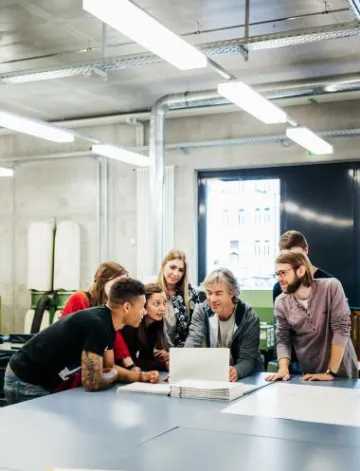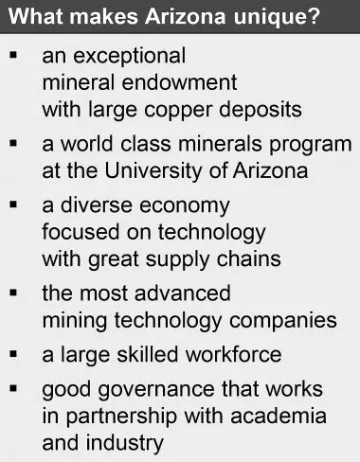Focus is on educating the workforce of the future and closing the gap between industry and academia
Copper, lithium, cobalt, and a whole range of other mineral resources will be needed in ever higher volumes. Mining them in an economically, socially, and environmentally sustainable way is a challenge UArizona colleges are determined to tackle with a new interdisciplinary school. It will span the full mining and mineral resources life cycles, from discovery to reclamation and recycling.
December 21, 2020
Demand for mineral resources is increasing due to global population growth, the shift toward clean energy, increasing reliance on technology, and infrastructure development needs. At the same time, finding and extracting these minerals is growing more complex. Easy deposits have largely been mined, remaining deposits are deeper underground, contain lower grade ore, and might be in locations difficult to access or posing geopolitical challenges. Mining will inevitably move in closer to communities and special ecosystems. This raises increased concerns over environmental, social and governance issues like carbon emissions, land use, impact to biodiversity, water and energy consumption, community health and safety, protection of cultural heritage sites, and ethical sourcing.

Given these challenges, it is no surprise that workforce preparedness is among the top concerns expressed by global mining industry leadership. But the university programs training future miners have not kept pace with change, and many struggle to survive. Between 1980 and 2017 the number of mining engineering programs halved from 25 to 13 in the US alone. Globally, enrollment in minerals programs has been decreasing, leading to possible closures of these high-cost programs.
UArizona steps up to the plate
The University of Arizona, with its long tradition in mining education and top ranked programs in mining engineering and economic geology, is committed to stemming the tide and advancing mining and mineral resources education. In a joint effort, College of Engineering and College of Science are working toward establishing a new, interdisciplinary school, to better meet future workforce and innovation needs across all parts of the mineral resources and mining life cycles, from discovery to reclamation and recycling. This effort is supported by a recent gift from the Lundin Family.
In addition to traditional technical skills, mining skills required in the future are broader and more sophisticated, including more data, systems, social, complex problem solving, and resource management skills. This breadth and quality of well-rounded professionals can only be achieved by breaking through departmental silos and pulling together resources from all disciplines.
“The drive toward a safer, more sustainable and efficient operation requires the very best talent across disciplines, not just the traditional fields of mining engineering and geology,” says Jack Lundin, CEO, Bluestone Resources, member of the Board of Directors of the Lowell Institute for Mineral Resources, and UArizona alumnus.
Environmental science, business, data science, social sciences, hydrology and atmospheric sciences, law and policy, and a whole host of other engineering disciplines are all integral players in the mineral resources arena.
To meet the needs of employers, universities need to arm students with the knowledge and skills they will need to succeed in the workplace – critical thinking, an appreciation for cultural differences, the ability to apply data science, and the ability to communicate and work together across disciplines to problem solve. Experiential learning opportunities are key to students being workforce-ready.
Working toward a new school for a new kind of learning
The vision for the new school seeks to transform the way students, professionals and communities work across boundaries to meet the complex challenges of economically, socially, and environmentally sustainable mineral resources. Unconstrained by traditional disciplines, the school will take an issue-centric approach to mining and mineral resources education and research. Students, faculty and researchers will be thought leaders and change agents on important issues to positively impact the way mining happens – improving economic, environmental and social performance.

“Arizona is the place where solutions will be found that will positively impact the planet.”
Mary Poulton, Co-Director of the Lowell Institute for Mineral Resources
Strategic partnerships to leverage and mobilize the talent of global experts across industry, other universities, NGOs and governments will be a priority for the school. Partnerships will help create coursework aligned with industry needs and provide students with opportunities for extensive hands-on experiential learning, research and internships.
Through its programs and partnerships, the school will elevate the status and quality of mining, engineering and mineral-resources-related studies and research to something the best students, faculty and researchers want to be a part of so that we can attract the diversity and quality of talent needed in mining worldwide.
“Our vision: creating the best mineral resource program in the world.”
Jack Lundin, CEO, Bluestone Resources
The school will offer a variety of interdisciplinary undergraduate and graduate programs as well as professional development courses to students and professionals in Arizona and around the world.
Interdisciplinary education and research related to mining is not a new concept at UArizona. Programs such as the Global Mining Law program and interdisciplinary research centers like Center for Environmentally Sustainable Mining have been serving the needs of students, industry, government agencies and communities for nearly a decade.
Bringing the vision to life
An interdisciplinary faculty working group is planning a truly innovative curriculum and new methods of delivering courses – for undergraduates seeking to learn about how they can contribute to the sustainability of mining and mineral resources, professionals looking to gain more knowledge in their areas of specialization, and communities trying to understand how mineral resources are developed and managed. These opportunities will serve to widen the aperture in terms of the diversity of students who choose to engage in mining and mineral resources studies, research and careers.
Over the next two years a dedicated team of faculty and staff will continue with the work needed to turn this vision into a reality. Follow our story as UArizona steps up to prepare the next generation of talent to meet the grand challenge of responsibly and sustainably providing critical mineral resources to a growing global population.

